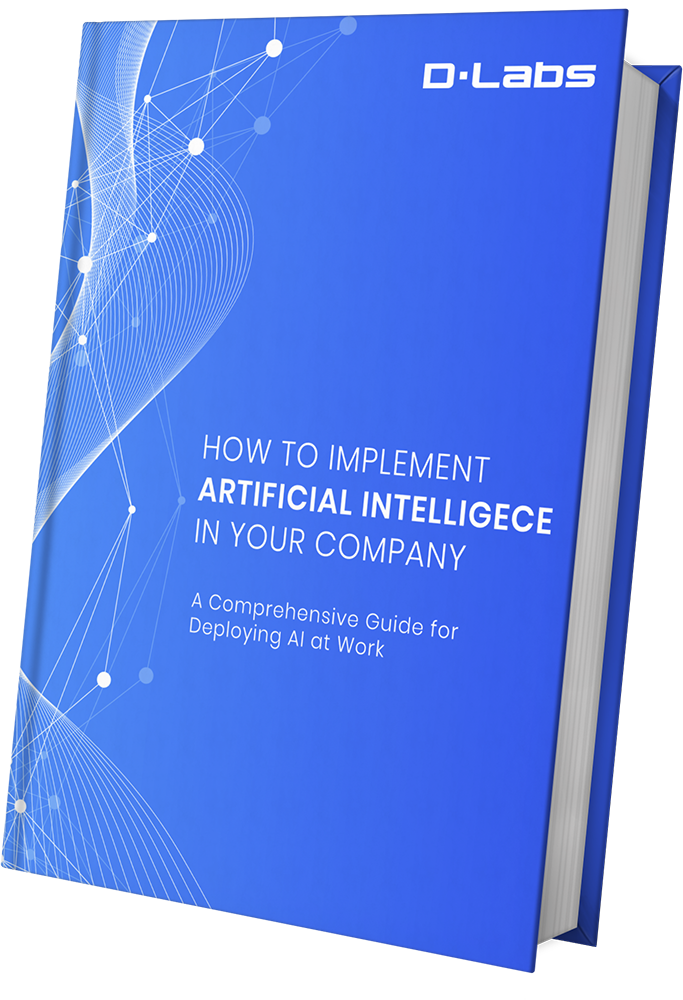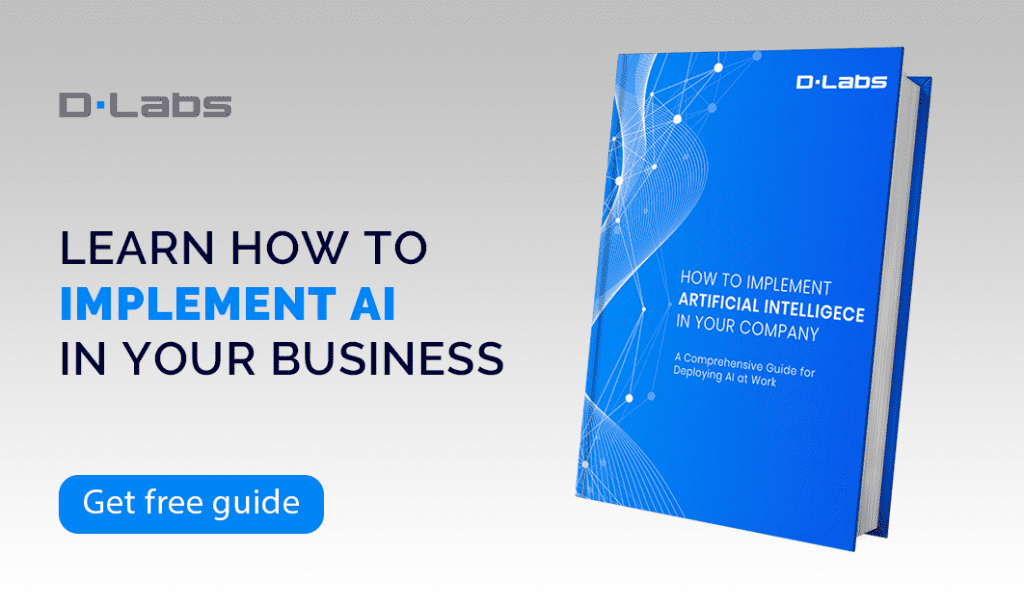Nowadays, hiring the right people to create technical solutions in any field is riddled with risk. So, how does anyone go about finding skilled professionals to help them improve business performance using complex frameworks based on Artificial Intelligence? And what steps can you take to verify if an AI developer can genuinely deliver on their promise of results? The answer may be simpler than you think.
Often, the best step forward is to outsource development to tried-and-tested AI-specialists — and here are five revealing questions to ask any development team before tasking it with your AI project.
Artificial Intelligence is the “future of modern companies.”
First up, let’s consider why it’s worth investing both time and money in AI.
According to the Forbes report, “Everyday AI: Harnessing Artificial Intelligence to Empower the Knowledge Worker,” three-out-of-four executives from American companies believe that AI and related technologies will have a transformational impact on their industry. Why? Because AI and Machine Learning is the future of modern companies.
The technologies help them:
- Increase employee productivity and efficiency by automating routine tasks and processes
- Improve marketing activities by generating content that reflects client needs
- Save time and money by replacing manual systems with automated software
- Avoid human error stemming from complex mathematical equations and analysis
- Achieve the best business results thanks to insights that predict client needs, and allow companies to deliver personalized solutions
- Maximize sales opportunities and increase revenues
- …and much, much more
…but only if you find a partner who can deliver results — the next few pages detail precisely how to do just that.
Over the next decade, AI could generate an additional $15.7 trillion worth of economic activity across the world.
— Source: Global Artificial Intelligence Study, PwC
Why outsourcing Artificial Intelligence development could be better than hiring in-house?
When faced with a project that requires a new skill-set, most companies ask themselves: do we on-board the necessary expertise? Or do we outsource? Given the current landscape, hiring highly-skilled software developers — or any specialist in AI — is extremely hard.
The Global AI Talent Report 2019 says that, by year-end 2018, the number of qualified AI experts across the world totaled just 22,400. That’s hardly a surprise, given the AI industry is still in its infancy. So, it’s going to be a challenge for any business to find candidates who have the skills and experience they need.
What’s more, the entry threshold of Machine Learning is sky-high. Why? The specialization requires in-depth mathematical skills, coupled with broad professional knowledge. In short, if an employee isn’t comfortable working with mathematical analysis, statistics, probability calculus, and linear algebra on a daily basis, they’re probably not up to the task.
Moreover, hiring developers is a long, challenging, and expensive process. While it’s worth emphasizing: most recruiters don’t know how to evaluate technical skills. So, you’ll likely end up hoarding the time of your most experienced developers, just to find the right candidate to hire — taking the above into account, outsourcing AI development is becoming ever more popular.
Sidebar: It’s worth adding that outsourcing is not a new practice. In fact, the term dates back to 1970s America when companies looked to increase efficiencies by hiring outside agencies to manage time-consuming, specialist processes: tasks like finance and accounting.
To start with, most employers regarded outsourcing as fragile. That exposing sensitive data and company finances to an outside partner was risky business. Further, the general population was afraid that offshore outsourcing could cause an increase in unemployment. However, the facts dispel any concern.
As noted in The Outsourcing Revolution. Why It Makes Sense and How to Do It Right by Michael F. Corbett: “As offshore outsourcing increased from 1970 to 2002, the U.S. economy boomed. Its service jobs increased from 47 million to 107 million, and per capita income rose from $12,543 to $22,851”.
According to The Payroll Operations Survey by Deloitte; today, more than 50% of U.S. companies outsource part or all of their payroll operations and tax reporting. Moreover, 69% of them are satisfied or highly satisfied with their current outsourced payroll service arrangement. And nowadays, IT outsourcing is becoming similarly popular.
According to IT Outsourcing Statistics by Computer Economics, IT outsourcing in 2019 averaged 12.7% of the total IT budget: a sharp increase from the 9.4% figure recorded in 2018. It seems many companies are coming to realize that outsourcing AI development could be a better business solution, not only saving time and money but also helping enterprises partner with established and integrated AI teams.
And lest anyone forget, outsourcing ensures people get to work with leading domain specialists, irrespective of geography. So, there’s always a strong case for outsourcing — but how to find a skilled team?
Let’s look at the five questions you can ask to ensure you only ever work with the best professionals.
Five questions to ask before outsourcing Artificial Intelligence development
If you outsource your AI development, you must make every effort to find the best team for the task at hand. And always be sure you can trust the people you end up working with — but how can you be sure?
Plain and simple: by asking these five revealing questions.
1. Does the team appear professional?
First of all, check the professionalism of the team. See what information you can find online; search for details relating to past projects, and take note of how many companies the team has served.
Then, read testimonials from clients, and always check the authenticity of recommendations; only if you’re satisfied with these preliminary checks should you consider making an appointment for a consultation with a member of their AI team. And during that conversation, be sure to ask for ideas for your project; maybe even a proposal to work with your business.
Finally, think very carefully about whether the proposal sounds interesting, what risks the agency has identified, and if they have a clear strategy to mitigate the unknown: every AI project has a level of inherent risk.
AI developers who paint too green a picture likely don’t understand the landscape, which could be a red flag indicating a lack of professionalism.
See also: How to implement Artificial Intelligence in your company?
2. Does the team have a portfolio?
Before you speak with the team, take a look at the agency’s portfolio (you should be able to find it on the company website, but if you can’t, request to see it).
Every credible outsourcing company will have a portfolio documenting past projects: it is the business card of a company and its main bargaining chip when it comes to securing new clients.
When reviewing the portfolio, pay particular attention to any projects that relate to your specific industry. And check if the developed solution delivered results — or if any other projects spark fresh ideas — as the portfolio could inspire your team to explore new opportunities.
3. Do team members have a relevant background?
Every team comprises of a group of individuals. If you want to find the most appropriate partner for your project, you need to check the professional experience of each team member:-
- Review LinkedIn profiles
- Browse professional histories
- Scour any pertinent search results
And if you need extra detail, GitHub can be a treasure trove of information. Moreover, it can help you assess if a team is made up of true tech enthusiasts who work on pet projects after-hours….
Or if they see AI as little more than a day job.
4. Is the team focused on the core technologies and nothing else?
It’s worth repeating this one point: AI is a hyper-specific specialism that’s difficult to master.
It takes experience, intelligence, and a particular combination of skills to create algorithms that leverage machine learning. So, if you outsource your AI development, be sure to find an agency that’s specialized in Big Data, AI, Machine Learning, Large Language Models and….
….nothing else.
Only dedicated developers can help you optimize business workflows using Machine Learning. Only the right expertise can resolve business problems with advanced AI solutions (where standard software might not be fit for purpose).
When you invest significant sums in complex, AI-driven products, you’ll want to know you’re working with the right mix of professionals. If you’re wondering what that mix looks like, it should resemble an eclectic group made up of — physicists, statisticians, mathematicians, programmers, and UX designers, alike.
5. Is the agency focused on fees? Or is their focus on helping your business get results?
One of the simplest ways to test an agency’s professionalism is to see where their priorities lie.
- Is their only concern around when you’ll pay?
- Or are they more worried about if they can serve your specific needs?
The best agencies want you to succeed first-and-foremost, and they’ll remain by your side from conceptualization through to implementation.
They’ll work hard to exceed your expectations, and they’ll continue to refine products and algorithms to deliver an optimum return on your investment. Less professional agencies, on the other hand, will do what it takes to turn a profit; with your needs taking a backseat.
To help you identify which bracket your candidate agencies fall into, we’ve created the following checklist:
- Is the agency willing to put in the time to understand your strategy first? And can the team explain how AI supports your vision? (Beware: If a team wants to jump straight in and start developing, the chances are, its people don’t care if AI fits your needs.)
- Is the team willing to offer an upfront risk assessment of your project? (This may be free or paid, depending on the scope and scale. But every project has risk, and every genuine AI developer will surface these risks before taking on a project.)
- Has the agency checked the available data? If yes, has the team checked your company is prepared to manage an AI-driven product? If your company isn’t ready to implement a solution, is the agency willing to give you a list of steps to prepare? (The best teams carry out each step.)
- Is the agency willing to illustrate how it can measure success? And how will the development team demonstrate progress at frequent intervals? Most importantly, how will the agency continue to support your team post-implementation? (Beware: If you don’t get an answer to each of these questions, the development team may not be the best choice.)
As ever, the more specific the response, the better.
After all, it’s crucial your partner uncovers your specific project needs and challenges if they’re to develop a high-performance, AI-driven solution.
Moreover, you need to have confidence that your outsourcing partner will invest the time to get to know you and your business, then continue to support your team — even after implementation.
When you’re ready to start, start small.
Even after you’ve chosen an agency to work with, there’s one more test for them to pass.
So… before you invest too heavily — and rather than blowing the budget by trying to tackle your most complicated assignment first — start the team off with something smaller, cheaper, and a lot less risky.
Treat the project as a trial-run in which both sides of the partnership test out the collaboration. This way, you can each check the workflows fit expectations, and that you’re both happy to collaborate for the long haul.
Even though it’s a smaller project, you should still maintain the same high standards of communication, request progress updates with ongoing reviews, and check the team is open-minded when it comes to discussing feedback.
Once you’ve seen their creative flair coupled with the motivation to deliver results-driven increments to your business, then you can decide if the business relationship has a long-term future.
If it’s a yes, get ready for many productive years ahead.
Are you looking to develop AI solutions that enhance your business processes?







